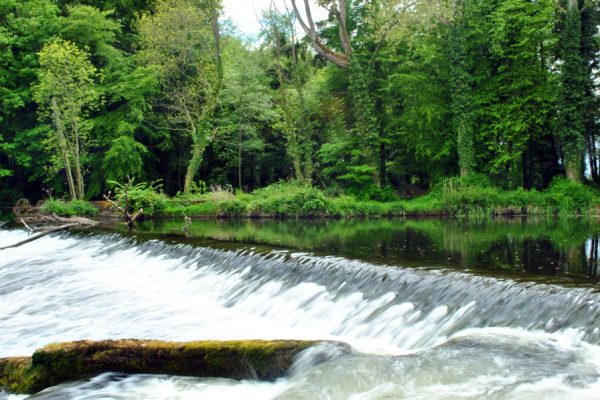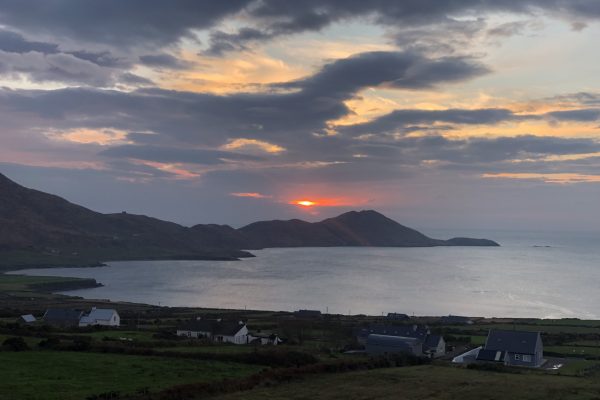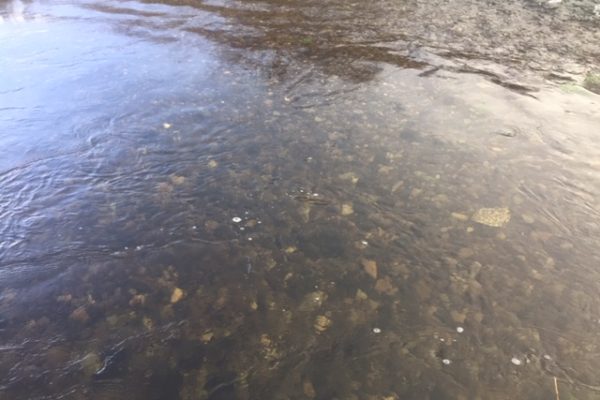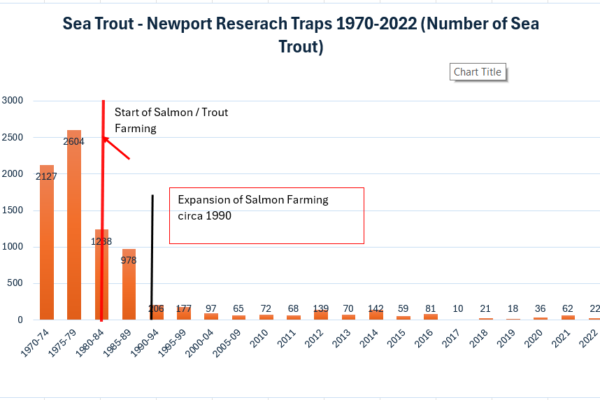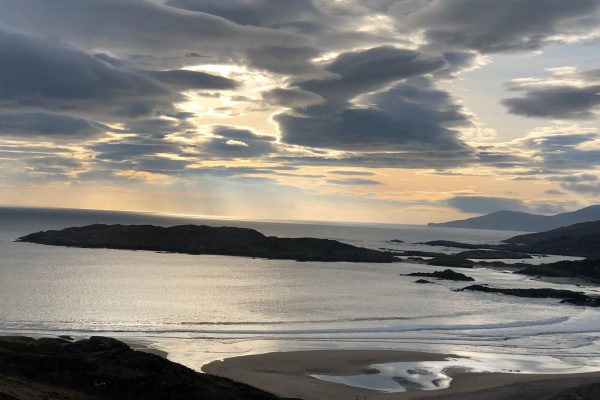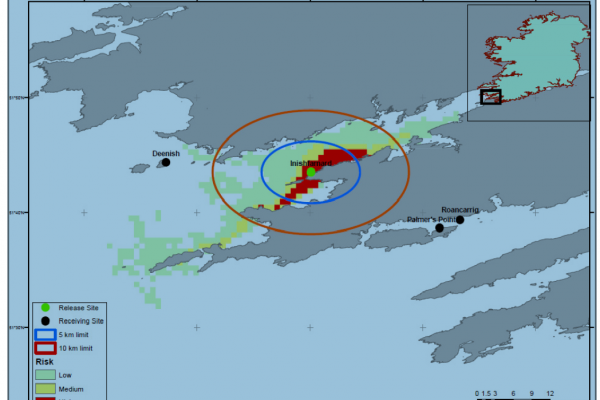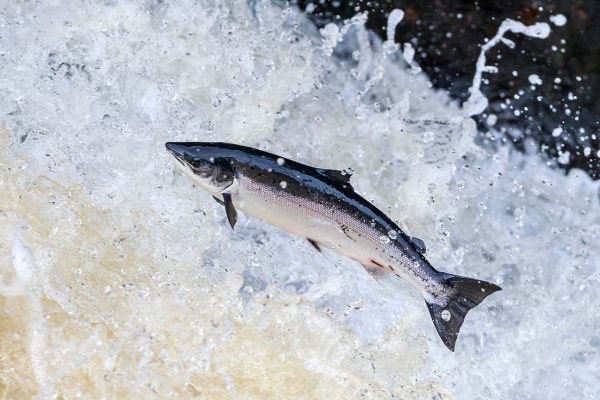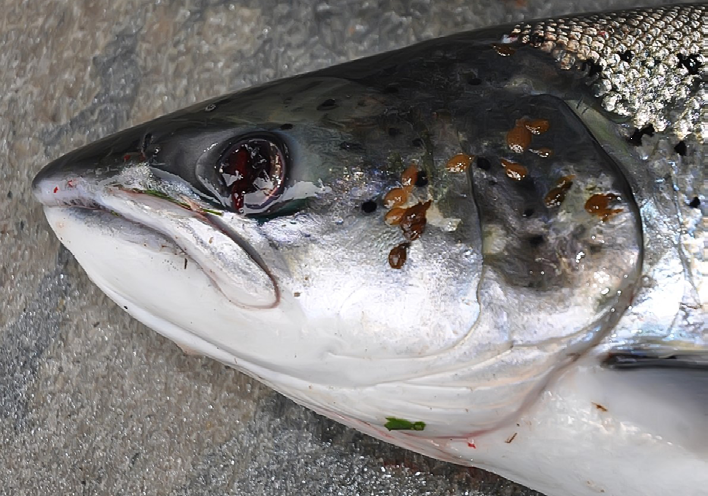-
Barriers Report – Joint Oireactas Committee
The Committee agreed to examine the issue of barriers to fish migration in Irish rivers as part of its 2024 work programme. The Committee held a number of public engagements and received written submissions on this issue and acknowledged the difficult balance between flood risk management and conservation and enhancement of fish populations.This report contains ten recommendations which the Committee feels will serve to meaningfully address factors inhibiting the effective removal and mitigation of barriers in the Irish river network. Barriers Report 2024
Continue reading -
Atlantic salmon – Coming home earlier, smaller and in a compressed time period
The annual EPA conference took place in June 2024 in Galway. Summarising 70 years of research in the Burishoole Catchment, Elvira De Eyto outlined in a very concise and illuminating video presentation how climate data and water quality have changed within this index catchment over 70 years. Our interest is primarily the data surrounding Atlantic salmon and the presentation demonstrated that wild Atlantic salmon are returning earlier, returning at a smaller size and during a more concentrated time period. Survival from ova to smolt appears relatively stable with less than 1% survival but survival at sea has declined alarmingly. One interesting note is that since the closure of the drift net fishery there has been no increase in survival at sea indicating a substantial decline since 2007. The catchment continues to be below its conservation limit thus compromising the output of smolts from the catchment. The video is well worth watching and given its long term data is essential to our understanding of Atlantic salmon. Burishoole Video There are other video which you may find interesting and these can be viewed here. EPA Conference 2024
Continue reading -
Ballisodare Atlantic Salmon Mortalities
With a large number of mortalities and an ongoing investigation by IFI and the Marine Institute it would suffice to say that to lose up to 900 adult salmon is a tragic outcome for this river. We await the outcome of the investigation but we are aware that it appears that the losses are primarily adult salmon. This may be related to oxygen demand as the river appears to be low over a prolonged period. Larger fish require higher levels of oxygen and large quantities in a relatively small area of a river can trigger stress and lead to secondary infections. Higher water may alleviate this but weakened fish may not survive even if distributed further upstream. There appears to be a rise in water over the past number of days and we will see if this alleviates the situation. While there are reports of a large run through the counter it is apparent that the loss of adult salmon at this scale can have consequences for spawning numbers and that other adult salmon may have a compromised survival chance through stress related secondary infections. We would certainly support an engineering solution to natural barriers if these are deemed to be partly responsible for the mortalities.
Continue reading -
Atlantic Salmon News
High Court Ruling - A good day for Atlantic salmon The long running high court case against the Aquaculture Licence Appeals Board and the Department of Agriculture, Food and the Marine received judgement on Friday 12th July, and we were successful in having the decision to issue a salmon farm licence at Shot Head in Bantry Bay quashed and sent back to ALAB and DAFM for re-decision effectively forcing MOWI to start the entire process of applying for a licence again which will be subject to our full consideration and renewed objection on numerous environmental grounds. Briefly put, the Aquaculture Licence will be quashed for inadequate: i. AA Screening of the risk of effects of seal scarers on seals of the SAC. ii. EIA as to the risks of escape of salmon from the fish farm. This finding relates to necessity of re-consideration of bespeaking the DAFM reports on the 2014 farmed salmon escape in Bantry Bay, and comprehensiveness of the EIA as it related to the specification and structural integrity of the cage installation. iii. reasons for the conclusion that the proposed fish farm will not lead to a breach of WFD limits as to Dissolved Inorganic Nitrogen – specifically, reasons for reliance on RPS’s “typical” data in reaching that conclusion. In addition, I will declare that ALAB delayed unreasonably as to AA Screening from the making of the Appeals in October 2015 to embarking on AA Screening after the Oral Hearing Report of November 2017. I will grant no further relief on that account. The Foreshore Licence will be quashed as • contingent on the quashed Aquaculture Licence, Ministerial regard to which was a statutory requirement of granting the Foreshore Licence. • the Minister erred, in breach of s.82 of the 1997 Act, in granting the Foreshore Licence in 2022, in having regard to his Aquaculture Licence decision of 2015 rather than to ALAB’s impugned Aquaculture Licence determination of 29th June 2021. The full decision is at following link. Court Judgement
Continue reading -
Marine Institute – Sea Trout Collapse
This is a graph of sea trout collapse in the Burishoole system in the west of Ireland. This is a stark reminder that sea trout and salmon farming are mutually exclusive. Salmon farms basically make sea trout survival impossible. This station is operated by the Marine Institute which is in denial of the destruction of wild salmonids by salmon farms. The recent post from Alexandra Morton showing the effect bares a striking resemblance to this. The data source is the annual report of the Newport Research which is publicly available at the following link. Marine Institute Report There is a data set of both salmon and sea trout spanning back to 1970.
Continue reading -
Lots of Licences for Salmon Farming – DAFM Active
Spate of Salmon Aquaculture Licence Applications for renewal and review. They are not out for public consultation as yet but will be in a number of days. Please find link to applications. https://www.gov.ie/en/search/?q=&sort_by=published_date&type=aquaculture_licence#search_result_label_id
Continue reading -
Genetic Impact – Escapees Norway – Is Ireland suffering same outcome
This is a very impressive portal which demonstrates the genetic introgression from farmed fish on river catchments. The resource is alarming as it shows how escapees have spawned and affected wild genetic integrity. In Ireland reports of escapes are non existent but we understand that a study is ongoing to understand the extent of introgression in Irish rivers. Norwegian Portal
Continue reading -
New Study on plankton in North Atlantic – Atlantic Salmon Survival
This new study reinforces the belief that Atlantic salmon survival has been compromised substantially by a changing ecosystem in the North Atlantic. We must redouble our efforts to substantially increase wild healthy juveniles going to sea and give them the best chance of survival by protecting water quality and habitat integrity. Mitigation for ecosystem compromise in the ocean is essentially difficult short term but larger healthy wild smolts going to sea will certainly improve survival. New Missing Salmon Alliance paper brings us closer to understanding the decline in marine survival of wild Atlantic salmon
Continue reading -
Please Help Atlantic Salmon in 2024
This year we have seen a continuation of poor returns to Irish rivers. There may be many factors involved in this situation but it is evident that we collectively need to secure as many large spawning fish as possible to bolster compromised spawning escapement. To help in this matter Salmon Watch Ireland is asking all angling stakeholders to minimise their impact on remaining stocks. The angling stakeholders have a choice and can limit their catch. The over generous national limit of an individual harvesting ten salmon should be substantially reduced this year by the voluntary actions of the angling community. We would ask that angling is carried out with a view to releasing fish by using appropriate methods. We also request that salmon of over 65cm be released and no fish should be harvested in September. The choice to do this is voluntary and we will be asking that these over generous rules involving individual harvest by anglers to be substantially reduced going forward. While we have requested that commercial fisheries should be closed going forward and a appropriate scheme to alleviate hardship on fishermen be introduced, we are going to canvass the commercial sector through Inland Fisheries Ireland this year to reduce their effort and limit their uptake of quota. We will request that if fish counter results show a substantial decline on normal (poor) returns by mid July, Inland Fisheries Ireland and Department of Environment , Climate and Communications should consider that exploitation be further controlled by regulation. In the interim it would greatly help the situation if all stakeholders cooperated in this voluntary effort to protect what remains. We in Salmon Watch Ireland are conscious that salmon are under enormous pressure in all countries and we would hope that in future there may be an improvement in stocks which would allow a sustainable harvest by stakeholders but this present situation is alarming given the widespread and accelerating decline. Please limit your catch
Continue reading -
Kenmare Bay – Disregard for Special Area of Conservation
Kenmare Bay is located in the South West of Ireland and is home to two currently operating salmon farms (Deenish and Inishfarnard) owned and operated by MOWI. There are two other farms within the bay which are not currently operating with a further application pending for another site near Inishfarnard. The farm at Deenish was ordered to close in April 2019 but has continued to operate pending the outcome of an appeal which has yet to be determined. This situation is appalling considering that five years have elapsed without any sign of determination. The farm has been allowed to continue to the detriment of the once famous sea trout fishery in Waterville. This fishery had the potential to generate up to three million euro for the local economy but is essentially now derelict with little if any angling tourism in the area. Make no mistake this fishery can be returned to a vibrant fishery with economic prosperity returning if salmon farming is removed from Kenmare Bay. No sea trout fishery has ever survived along side open pen salmon farming and Waterville is no exception. This situation is completely mirrored in the west of Ireland, Scotland and Norway. It is worth noting that when the farms in Kenmare Bay were closed in the period from 2004 to 2009 there was a substantial increase in sea trout numbers and a rebalancing of the population through all age groups. Waterville is home to genetically distinct sea trout and are a national asset which has been effectively destroyed by salmon farming. In 2023 MOWI applied for a renewal of their expired licences for Deenish and Inishfarnard and this is under examination by the Department of Agriculture, Food and Marine and is awaited with interest by all. There were a significant number of objections to these applications so we await determination but we expect this may take some time if previous experience is anything to go on. We would like to draw your attention to our submissions regarding the renewal applications and feel free to extract information to bolster your understanding of the issues surrounding salmon farming in Ireland. Inishfarnard Submission Deenish Submission
Continue reading

